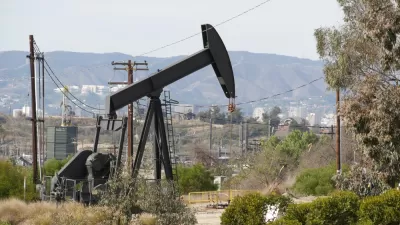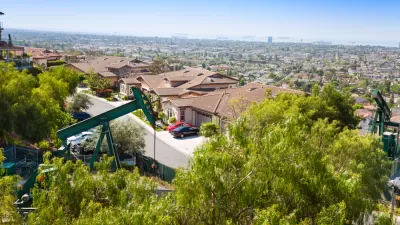The long history of oil extraction in the nation's most populous county is entering its final chapter.

"Los Angeles County took the first steps toward winding down oil extraction in unincorporated areas, reports Dharna Noor of a decision by the County Board of Supervisors earlier this week. Unincorporated areas account for 65 percent of the county's land area.
The vote prohibits the permitting of new oil wells and launches a process to evaluate existing oil wells. "Currently, existing oil wells cannot legally be shuttered until owners recoup the costs of drilling, so the evaluation will determine if costs have been recouped for each site," explains Noor.
"The measure would also designate all existing oil and gas extraction activities as 'nonconforming' uses, which could allow county officials to revoke drilling permits."
The new law has the potential to shut down 1,600 wells, including the 1,000-acre Inglewood Oil Field—the largest urban oil field in the United States. "More than 1 million people live within a 5-mile (8-kilometer) radius of the field, including several neighborhoods that are mostly populated by people of color," according to Noor.
The article includes details about the environmental and public health risk of urban oil extraction—making the county's vote a historic environmental justice victory.
Additional coverage of the vote is available in a separate article by Drew Costley.
FULL STORY: The Beginning of the End of Oil Is Here for Los Angeles County

Alabama: Trump Terminates Settlements for Black Communities Harmed By Raw Sewage
Trump deemed the landmark civil rights agreement “illegal DEI and environmental justice policy.”

Planetizen Federal Action Tracker
A weekly monitor of how Trump’s orders and actions are impacting planners and planning in America.

The 120 Year Old Tiny Home Villages That Sheltered San Francisco’s Earthquake Refugees
More than a century ago, San Francisco mobilized to house thousands of residents displaced by the 1906 earthquake. Could their strategy offer a model for the present?

In Both Crashes and Crime, Public Transportation is Far Safer than Driving
Contrary to popular assumptions, public transportation has far lower crash and crime rates than automobile travel. For safer communities, improve and encourage transit travel.

Report: Zoning Reforms Should Complement Nashville’s Ambitious Transit Plan
Without reform, restrictive zoning codes will limit the impact of the city’s planned transit expansion and could exclude some of the residents who depend on transit the most.

Judge Orders Release of Frozen IRA, IIJA Funding
The decision is a victory for environmental groups who charged that freezing funds for critical infrastructure and disaster response programs caused “real and irreparable harm” to communities.
Urban Design for Planners 1: Software Tools
This six-course series explores essential urban design concepts using open source software and equips planners with the tools they need to participate fully in the urban design process.
Planning for Universal Design
Learn the tools for implementing Universal Design in planning regulations.
Clanton & Associates, Inc.
Jessamine County Fiscal Court
Institute for Housing and Urban Development Studies (IHS)
City of Grandview
Harvard GSD Executive Education
Toledo-Lucas County Plan Commissions
Salt Lake City
NYU Wagner Graduate School of Public Service





























